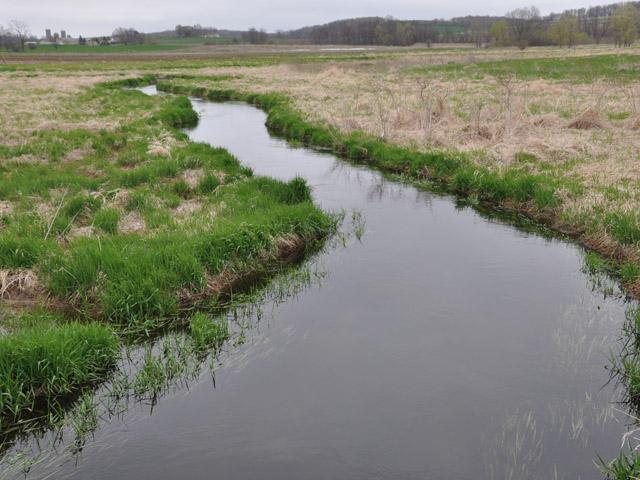Court Puts WOTUS Hold in Texas, Idaho
Federal Judge Grants Injunction Putting WOTUS Hold in Texas, Idaho
LINCOLN, Neb. (DTN) -- A federal judge in Texas granted a preliminary injunction on Sunday, halting the Biden administration's waters of the U.S. rule in Texas and Idaho, pending the outcome of a lawsuit filed by the state of Texas and several industry groups including the American Farm Bureau Federation.
U.S. District Judge Jeffrey Brown in the Southern District of Texas in Galveston put the injunction in place as the rule took effect on Monday in the rest of the country. The injunction will remain in place pending consideration of motions to vacate the rule and send it back to the EPA.
Brown, a Trump appointee, denied a motion for a national injunction against the new rule by ag groups led by the American Farm Bureau Federation.
Texas and five agencies in the state filed a lawsuit against the EPA and the U.S. Army Corps of Engineers on Jan. 18 and a total of 18 interest groups including the agriculture, oil and housing industries filed suit a day later in the same court in Galveston.
There are two other lawsuits pending in federal court in North Dakota, where 24 states have sued the Biden administration, and in Kentucky where the state of Kentucky has sued the EPA.
In granting the preliminary injunction, Brown found Texas and Idaho have a "substantial likelihood" they would prevail on the merits of the case, would face a "substantial threat" that they would suffer "irreparable injury" without an injunction, that the threat of injury outweighs the "threatened harm" to the party they seek to enjoin and that the injunction was in the public's interest.
Brown, however, found the associations also party to the lawsuit, including the AFBF, have not shown "irreparable harm" if a national injunction is not issued.
The National Cattlemen's Beef Association said in a statement it was disappointed in the court's decision not to grant a national injunction.
"This latest WOTUS rule will place more burdens on family farms and ranches, drive up costs, and prevent cattle producers like me from making investments in our land," NCBA President Todd Wilkinson, a South Dakota cattle producer, said in a statement.
P[L1] D[0x0] M[300x250] OOP[F] ADUNIT[] T[]
"While we appreciate the court's injunction of the rule in Texas and Idaho, we are strongly disappointed in the decision to keep this WOTUS rule in place in 48 states."
Brown's ruling was critical of the Biden administration's use of two tests -- significant nexus and relatively permanent -- when making jurisdictional determinations.
"Even if the court assumes that Justice Kennedy's significant-nexus test appropriately measures the agencies' jurisdiction under the act, the rule does not accurately reflect his test," Brown said in his ruling.
"Indeed, the rule's substantial variance from Justice Kennedy's test compels the court to question its legitimacy and persuades the court that the plaintiffs will likely succeed on the merits. Certainly, the court agrees with the defendants that federally regulating some interstate waters may be necessary to carry out Congress's intent to protect the nation's waters but the court is not convinced that the act's text supports unrestrained federal jurisdiction over all interstate waters.
"As explained above, the court finds a substantial likelihood that the 2023 rule exceeds the agencies' statutory authority under the act."
Brown's decision was seen as a setback by environmental groups that are defending the Biden administration's approach.
"This decision is a setback for the public, which has long depended on the Clean Water Act to safeguard downstream communities and the environment," said Stuart Gillespie, senior attorney with Earthjustice.
"We will work closely with our partners to ensure the law and science prevail, and that our communities receive the protections afforded by the Clean Water Act."
Texas and the ag groups said in motions the court should stop the agencies from implementing the rule, pointing out their concerns with the reach of the new rule.
"The rule abandons any limitation to waters that impact interstate commerce, relying on an arbitrary 'significant-nexus' test that strays far from any legal authority," Texas said in a motion.
"Texas asks the court for an injunction to support the public interest and prevent irreparable harm to Texas' sovereignty, its agencies' core objectives and incurrence of unrecoverable costs to comply with a rule unlikely to survive review."
Texas argued the WOTUS rule effectively asserts jurisdiction "over non-navigable, intrastate waters based solely on whether the use, degradation, or destruction of the water could affect interstate or foreign commerce."
Texas said the rule "unlawfully expands" federal jurisdiction and "arbitrarily casts federal authority over a remarkable array of water features (or dry land).
"The issue before the court is whether Texas must incur the burden and expense of complying with a federal 'clarification' while Texas challenges that rule as federal overreach," Texas said in its motion.
Read more on DTN:
"Texas, Ag Ask for WOTUS Injunction," https://www.dtnpf.com/…
"EPA Opposes Ag Intervention in WOTUS," https://www.dtnpf.com/…
"Aggies Join 24-State Lawsuit vs. WOTUS," https://www.dtnpf.com/…
Todd Neeley can be reached at todd.neeley@dtn.com
Follow him on Twitter @DTNeeley
(c) Copyright 2023 DTN, LLC. All rights reserved.



